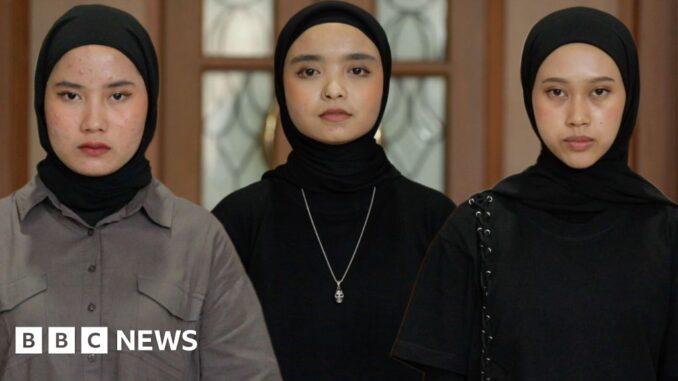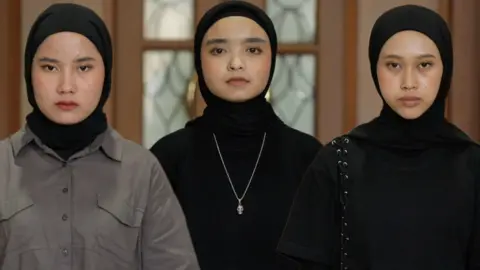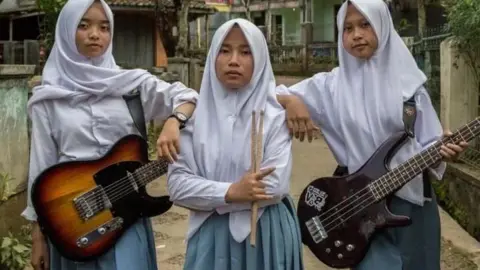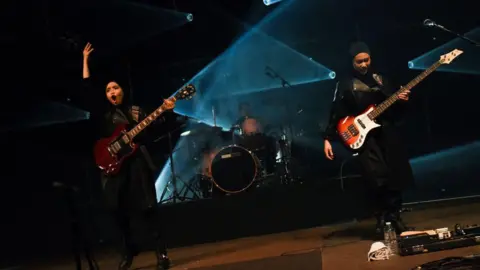
The three girls started making metal music at high school, but they never thought they could make history for Indonesia at Glastonbury.
The band they formed – Voice of Baceprot – are playing the festival this year and when they found out they’d been invited they were “confused”.
“Because we didn’t know how exciting [the festival] is… We didn’t know what to do next,” the band’s lead singer Firdda Marsya Kurnia said.
The pressure was on after the trio realised they would be the first Indonesian band to play at Europe’s largest music festival. Headliners at this year’s five-day festival include Coldplay and Dua Lipa.
Voice of Baceprot – made up of Marsya, drummer Euis Siti Aisyah and bassist Widi Rahmawati – are performing on Friday. Baceprot (pronounced “bah-che-prot”) means “noise” in Sundanese, one of the most widely spoken languages in Indonesia.
The three women have come a long way since their village school 10 years ago.
They have made international headlines for challenging gender and religious norms, and have toured internationally, including in Europe and the US.
They have also been praised by the likes of Rage Against the Machine, whose guitarist Tom Morello said he watched one of their videos “10 times in a row and was just blown away by it”. Flea from Red Hot Chilli Peppers once tweeted, “I am so down with Voice of Baceprot.”
But Glastonbury will be their biggest stage yet.

Marsya, Siti, both 24, and Widi, 23, sat down with the BBC a week before their historic show to talk about their journey since they started playing music together as three restless schoolgirls.
‘Rebel’ girl band
Growing up in the rural town of Singajaya in Indonesia’s West Java province, Marsya and Siti became friends in elementary school. They met Widi in junior high school – at the school counsellor’s office where they were regularly summoned for “rebellious behaviour”.
It was in this unlikely place where their love for heavy metal took root. They struck up a friendship with the counsellor, Father Ersa.
“We listened to music from our counselling teacher Abah Ersa’s laptop… We get an adrenaline rush when we listen to heavy metal and we thought, it would be so cool if we can cover those songs,” Siti said.
Ersa says he realised the girls were not rebellious in the same way as some other teenagers, who might take drugs or get into trouble. Instead, they often spoke up for what they felt was unfair in school.
“They opposed the system and often clashed with their teachers. Their statements were then considered provocative,” he said.
 Voice of Baceprot
Voice of BaceprotIn 2014, Ersa encouraged the girls to express their emotions through music. He introduced Marsya to the guitar, Widi to the bass, and built Siti a makeshift drum using unwanted parts left behind by the school’s marching band.
“We let our anger flow through our music… because we don’t want to get into trouble by getting angry with others.
“If we protest, it will be a problem. We will be accused of being radical. In our village, the women who protest will be called crazy,” said Marsya, who comes over as the most outgoing of the three.
Back then, playing music also motivated them to go to school, she added.
“We were just told to get good grades… memorise, write, flip the books, that’s it. This was our daily routine for 12 years. We were bored. Then, there was music. It was something new.”
The band credits Ersa as their founder. He was the first to publish their music on YouTube. Today, they have 360,000 subscribers on YouTube and 230,000 followers on Instagram.
Shaking off criticism
But the band and their music have also struck some nerves.
Some people in their town, dominated by conservative Muslims, did not respond well when they ventured into heavy metal. Marsya was once hit on her head by a rock attached to a note telling her to “stop making the devil’s music”.
About 87% of Indonesia’s population are Muslims. West Java is among the more conservative provinces and includes denominations that forbid music and singing.
Some people find the combination of hijab-wearing women and heavy metal music particularly provocative.
“Some even said I should take off my hijab [as our music] does not reflect a true Muslim. But these are separate things. Metal is just a genre of music. I wear a hijab because it’s my identity as a Muslim… It’s not because I want to be sensational,” Marsya told BBC Indonesian in an earlier interview in 2018.
Marsya, Siti and Widi have earned their families’ support over the years, though not without pushback – Widi’s older sister had warned her that playing heavy metal would “ruin her future” while Siti’s family had described her music career as “unserious”.
Even the principal of the Islamic school they went to after junior high criticised their music. The girls later dropped out.
In 2021, they released the single God, Allow Me (Please) to Play Music, which serves as an empathic plea against these criticisms.
The band composed the tune, while Ersa wrote the lyrics. Its chorus goes, “I’m not the criminal, I’m not the enemy, I just wanna sing a song to show my soul… God, allow me, please, to play music.”
 Getty Images
Getty ImagesThe band have also written about their frustrations with patriarchy and the male gaze – a challenge they still face as female musicians – into the song, (Not) Public Property.
The song goes, “Our body is not public property, we have no place for the dirty mind. Our body is not public property, we have no place for the sexist mind.”
“It’s disappointing when what people notice is not our music and the effort we put into it. It’s really irritating,” says Marsya.
That said, the band recognise that the invitation to play at Glastonbury is a nod to their achievements. But it is also nerve-wrecking.
“We thought we were ready to take it on until everyone started glorifying the festival… We are able to better enjoy performing on stage when people don’t expect anything from us,” Marsya said.
Siti struck a more optimistic tone. “I’m not ready, but what the heck, I’ll pretend I am the star on stage. You’ll see that I often close my eyes in gigs because I’m imagining I’m just jamming in the studio with my band.”
Siti said part of the group’s mental preparation involves trying “not to overthink how many people would be watching us perform”. “If I know the size of the crowd, I think I won’t be able to handle it,” she said.
“We are proud of it, but on the other hand, it’s a big responsibility for us, because the audience aren’t just seeing VoB, but Indonesia,” Marsya said.



Be the first to comment